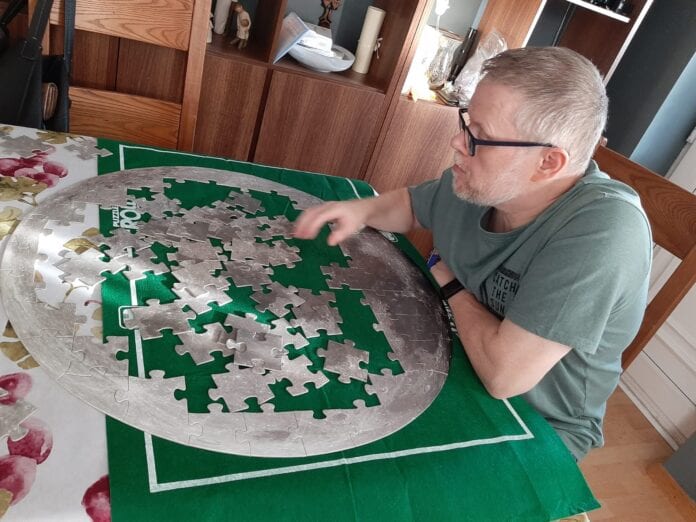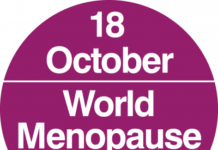The Stroke Association, the UK’s leading stroke charity, is announcing the top 10 priorities for stroke research, uncovered by a rigorous study involving stroke survivors like Garry Rees from Tredegar, carers and health and social care professionals in stroke. The charity’s new report – the first UK-wide project to map research priorities across the entire stroke care and treatment pathway – reveals where research can address the issues holding stroke survivors back from rebuilding their lives after a devastating stroke.
Garry Rees, aged 56 and a computer engineer from Tredegar, Wales, had a stroke in December 2019 resulting in him spending Christmas in hospital that year.
Garry would like to see more research focused on finding early warning signs of stroke before it strikes.
Garry says: “Before I had a stroke I had a very active lifestyle. I was running, swimming and cycling every week but, all of a sudden, I couldn’t physically do anything, which really got me down. My stroke left me with right-sided weakness. My family were amazing, looking after me, helping learn the things I needed to get me back to some resemblance of normality.”
Garry says: “I just wish we could find a way to detect stroke before it was about to happen so no one has to go through what my family and I went through. The day I had my stroke, I had been feeling unwell and went to see my GP who carried out some tests. The GP didn’t see anything wrong but that very evening I had a haemorrhagic stroke in my sleep. My wife woke me up as she became concerned about my snoring. I knew as soon as I woke and felt my arm was dead, that I’d had a stroke. My father had multiple strokes too. I was nearly afraid to speak as I knew that when I did, my speech would come out all wrong.”
Garry still lives now with emotional changes and severe fatigue which can still affect his speech.
Garry says: “The more fatigued or emotional I get, this seriously effects my speech. There’s other things too. With my right hand now, I go to type something and think I’ve pressed a key only to find that my finger hasn’t moved. It takes me so much longer now to type or to text. No one sees all that internal thinking and the work I have to do. They just see the end result.”
Garry took to building models with Lego and doing jigsaws to improve the dexterity in his right hand. His mental health suffered after his stroke too and he struggled to find a way to deal with how he was feeling.
Garry continues: “I tried to stay positive, I really did but it was tough when I felt like there was no one to turn to really. I would tell people what I thought they wanted to hear. That was when I was introduced to the Stroke Association support groups.”
Garry joined a number of online groups including the longstanding Blackwood Stroke Group.
Garry says: “I’m enjoying being back at work over the past few months. I’ve had to reduce my hours but that’s a good thing. I think before my stroke, my work/life balance probably wasn’t as healthy as it should’ve been. I’m happy now that I can give something back by helping others with computer troubles through the stroke support group.”
Each year there are over 100,000 strokes in the UK, that’s an estimated 7,400 here in Wales. As a result, there are now over 1.3 million stroke survivors in the UK. In Wales the figure is almost 70,000. However, according to the most recent figures from the UK Medical Research Council [3], only £30m of public and charity health research spending goes on stroke. This equates to less than £25 per stroke survivor per year compared to £161 per person living with cancer [4].
Juliet Bouverie, Chief Executive of the Stroke Association said: “One in five people will have a stroke in their lifetime. Stroke happens in the brain, the control centre for who we are and what we can do. Every stroke is unique because the brain is so complex and stroke can happen in any part of it. This means there are as many different impacts of stroke as there are stroke survivors, posing a huge challenge for research.
“Despite major breakthroughs over the last 10 years, we now know where there are significant blind spots in treatment and care. These are holding people back from rebuilding their lives. With the number of people having strokes set to rise – it’s predicted that the number of stroke survivors aged 45 and over could rise to 1.4 million in 2025 and 2.1 million in 2035 [5], the number of stroke survivors in Wales could rise by over 50% over the next twenty years, we must act now and invest in the research that will make the biggest difference to the lives of people affected by stroke.”
Over 1,400 people affected by stroke and professionals in stroke took part in the project, which was carried out in partnership with the James Lind Alliance (JLA), as well as individuals and organisations representing stroke patients, carers and professionals in stroke.
The Stroke Association is sharing the findings as part of its new report “Shaping Stroke Research to Rebuild Lives: The Stroke Priority Setting Partnership results for investment.” The report sets the agenda for stroke research and identifies the areas that most urgently need investment. There are two lists of ten priority areas: the first in stroke prevention and acute care, and the second in rehabilitation and long-term care, ranked in order of importance.
The top priorities in each list are:
· Interventions to stop stroke. Stroke strikes every 5 minutes in the UK, but we know that most (80-90%) strokes are preventable [1,6]. We need increased investment in research so people can avoid the devastating effects of stroke in the first place.
· Understanding of, and treatment for mental and emotional problems. Three quarters of stroke survivors experience a change in their mental health [7], we need research so that people can overcome significant effects such as anxiety and depression after stroke.
Dr Rubina Ahmed, Director of Research and Policy at the Stroke Association, said: “Charities like ours need to look for new ways to help stroke survivors with emotional, mental and communication problems. Establishing what research will make the biggest difference to stroke survivors and those caring for them is just the first step. Stroke research is severely underfunded. Just £1 in every £100 of public and charity spend in health research is on stroke and this just isn’t enough to solve the big and complex issues caused by stroke.
“The stroke funding crisis has been worsened by the coronavirus (Covid 19) pandemic, which has had a devastating impact on our income, halving the charity’s research budget. Stroke research is at risk, which means recoveries like Garry’s are at risk too. Your support can fund the research that will lead to breakthroughs in treatment and care. If you can, please donate so that we can make sure more stroke survivors can rebuild their lives after stroke.
“We would like to thank everyone who took part in this project: stroke survivors, their carers, professionals in stroke, the James Lind Alliance, the Steering Group members and our partners. By having your say for stroke, you have helped to shape stroke research to rebuild lives.”
Over the past 30 years the Stroke Association has played a crucial role in supporting stroke research in the UK. By establishing these priorities our charity can support the research that can make the biggest difference to the lives of people affected by stroke.
Find out how stroke research helps rebuild lives at stroke.org.uk/rebuildinglives or to donate, please visit: stroke.org.uk/savingresearch
To read the full list of priorities and the report visit: www.stroke.org.uk/psp
Help keep news FREE for our readers
Supporting your local community newspaper/online news outlet is crucial now more than ever. If you believe in independent journalism, then consider making a valuable contribution by making a one-time or monthly donation. We operate in rural areas where providing unbiased news can be challenging. Read More About Supporting The West Wales Chronicle























